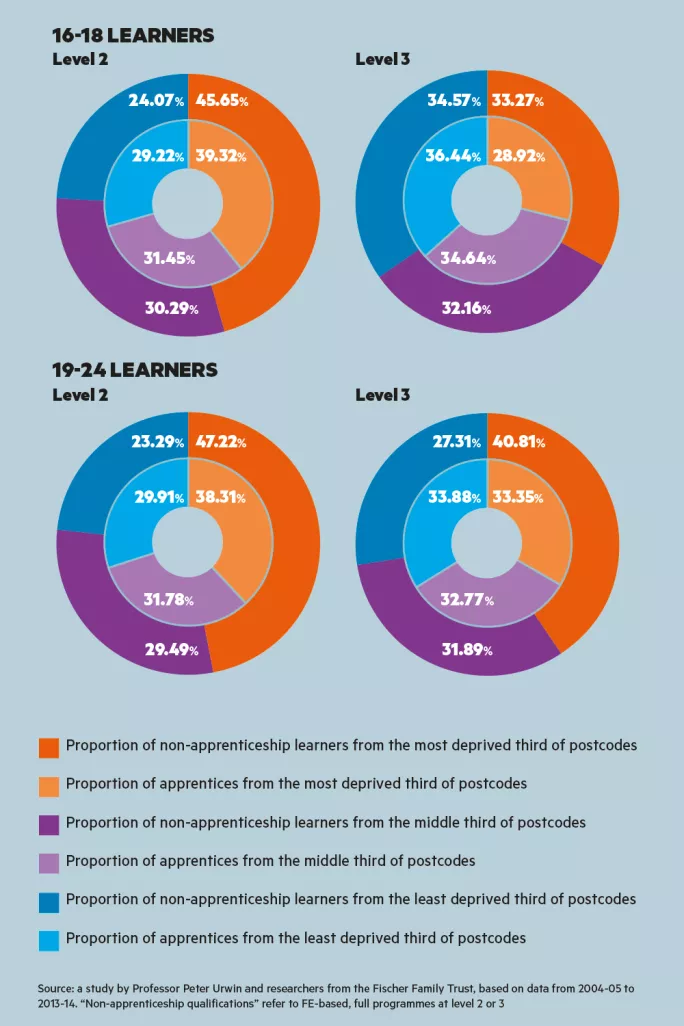Apprenticeships have been portrayed as a focal point of the government’s social mobility agenda. Indeed, the theme for next month’s National Apprenticeship Week is “ladder of opportunity”, highlighting the role they play in improving the career prospects of people from different backgrounds.
But major research reveals that, on average, apprentices tend to be from significantly less deprived backgrounds than learners taking other qualifications in FE settings.
Among 16-18 learners at level 2, almost 46 per cent of those taking non-apprenticeship qualifications are from the most-deprived third of postcodes, compared with just 39 per cent of apprentices.
And when it comes to level 2 learners aged 19-24, the gap widens: 47 per cent of those taking non-apprenticeships are from the most deprived backgrounds - almost 9 percentage points higher than the equivalent figure for level 2 apprentices.
Professor Peter Urwin, director of the University of Westminster’s Centre for Employment Research, who carried out the study, called on politicians to ensure that reforms to technical education and apprenticeships did not “stifle” the vital role of FE.
“Apprenticeships are something of an exception, and there is an argument that radical policy changes need to ensure that the drive for high-quality technical education does not stifle the role that FE and technical education currently play as important pathways to social mobility,” he said.
The research analysed the progress made by millions of individuals over a 10-year period, using data from the former Department for Business, Innovation and Skills, HM Revenue and Customs and the Department for Work and Pensions.
“At most levels of FE learning,” Professor Urwin writes, “for the two age groups considered, a higher proportion of FE learners are from disadvantaged/deprived backgrounds, when compared to an indication of the average [level of deprivation] for the whole of England.”
It is “not necessarily” the case that apprenticeships can be regarded as a “route to social mobility”, he adds. Apprentices have the “lowest average deprivation score” of all level 2 programmes. At level 3, 16-18 apprentices are, on average, “significantly more advantaged” than the average level of deprivation of the population as a whole.
‘Unclear goals’
David Hughes, chief executive of the Association of Colleges, said it was “important to remember that apprenticeships are not suitable for everyone, and so investment must be made into other forms of technical and professional education and training, for young people and for adults already in work”.
The latest data is part of a wider research project by Professor Urwin, commissioned by the Federation of Awarding Bodies. Chief executive Stephen Wright said: “This analysis reveals the crucial role that FE colleges and private providers play in providing a safety net for some of the most vulnerable young people, supporting them to gain the skills and knowledge they require for a rewarding career and reducing the risk of them falling through provision into the Neet [not in education, employment or training] category.”
Despite being presented with the research, a Department for Education spokesperson said apprenticeships “disproportionately benefit people from lower socio-economic backgrounds”. The spokesperson added: “We want to create a country where everyone has a fair chance to go as far as their talents will take them, breaking down the barriers to social mobility that too many face. Our apprenticeship reforms will give millions a step on the ladder of opportunity, ensuring that no matter what your background, if you work hard and apply yourself, you can succeed.”
This is an edited article from the 24 February edition of TES. Subscribers can read the full article here. This week’s TES magazine is available in all good newsagents. To download the digital edition, Android users can click here and iOS users can click here
Want to keep up with the latest education news and opinion? Follow TES FE News on Twitter, like us on Facebook and follow us on LinkedIn





